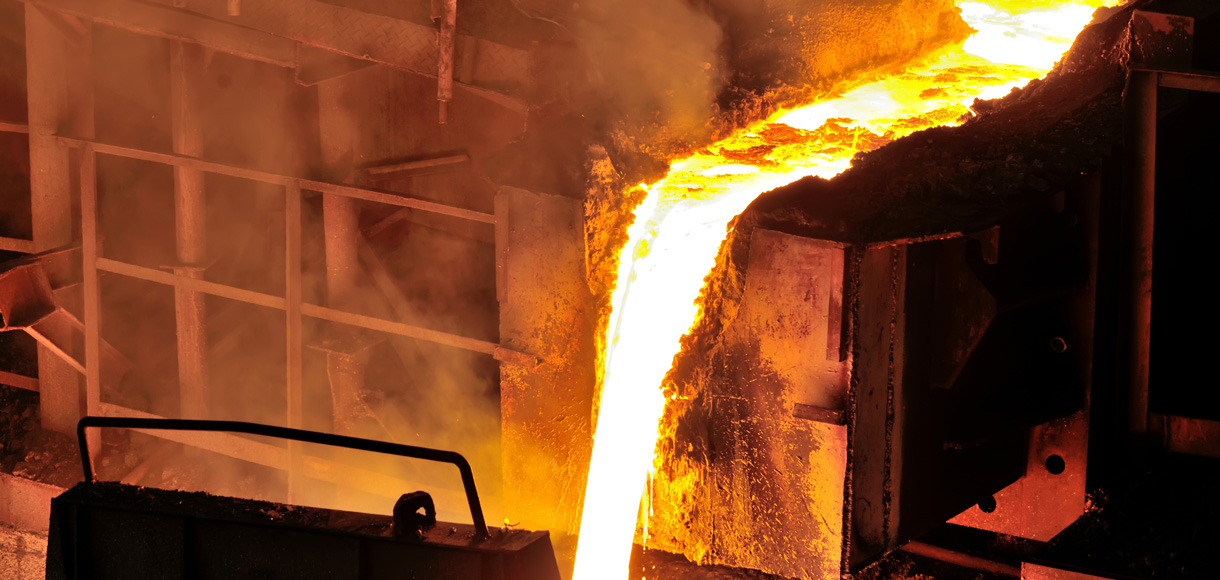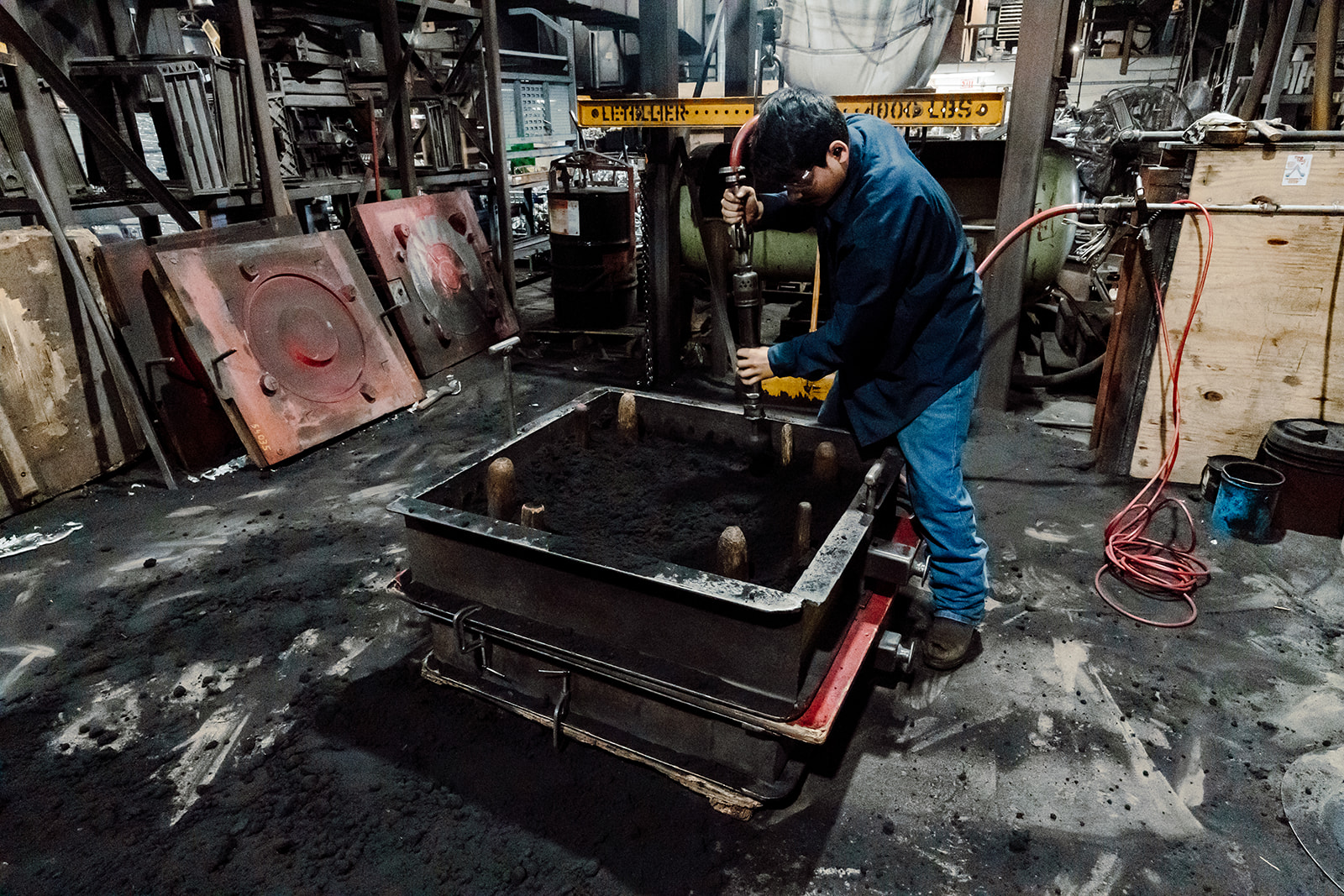How to Select the Right Casting Foundry for Modern Manufacturing
Wiki Article
Discovering the Important Function of Casting Foundry in Modern Production
Casting factories are crucial in modern manufacturing, offering important parts across varied sectors. Casting Foundry. Their ability to generate intricate, lightweight parts fulfills the expanding demands for performance and top quality. The landscape is advancing, affected by technological developments and sustainability worries. As these foundries browse possibilities and difficulties, their future role in manufacturing remains unpredictable. What techniques will they utilize to prosper and adjust in this vibrant environment?The Basics of Spreading: Understanding the Refine
Although Casting has actually been an essential manufacturing process for centuries, its concepts stay vital to modern-day industry. This procedure includes pouring a liquid material, commonly metal, into a mold to develop a details shape. The mold is made to develop the desired final result, which strengthens as it cools. Key phases in casting consist of pattern production, mold and mildew development, pouring, and ending up. Each phase requires mindful interest to information, guaranteeing that the end product meets high quality and dimensional standards.The flexibility of Casting permits the manufacturing of intricate geometries that would be impossible or tough to accomplish through various other manufacturing approaches. In addition, Casting can suit a variety of materials, consisting of metals and polymers. This versatility makes it an important technique for markets ranging from automotive to aerospace, supporting advancement and efficiency in the production of elements that fulfill the needs of modern applications.
Kinds Of Casting Techniques and Their Applications
Casting methods are varied, each tailored for details applications and product requirements. Sand Casting is among the earliest approaches, appropriate for big components and complex geometries, utilizing sand mold and mildews. Investment spreading, known for its precision, is perfect for elaborate layouts and is frequently utilized in aerospace and medical sectors. Pass away casting, frequently employed for high-volume production, enables for fast manufacturing of smaller get rid of good surface area coating, typically in light weight aluminum or zinc alloys. Shell Casting supplies a balance between both, offering great details and excellent stamina, making it popular in vehicle applications. Permanent mold and mildew casting, made use of for non-ferrous metals, supplies a tighter dimensional tolerance and much better mechanical buildings. Lastly, centrifugal Casting works for producing cylindrical parts, typically found in pipes and tubes - Casting Foundry. Each technique offers unique objectives, underscoring the adaptability and relevance of Casting in contemporary manufacturingThe Effect of Casting Shops on Industry Technology
As industries undertaking for greater effectiveness and product high quality, the duty of casting factories becomes significantly essential in driving innovation. These facilities offer as the backbone for generating complicated elements across various sectors, consisting of automotive, aerospace, and power. By leveraging advanced Casting techniques and materials, shops add to the growth of lighter, more powerful, and much more sturdy items that fulfill advancing consumer needs.
In addition, shops assist in making use of lasting methods, such as recycling metal and lessening waste, which aligns with modern market standards for ecological obligation. Eventually, the ingenious capabilities of casting shops not just boost producing efficiency however additionally drive whole industries into a future identified by technological innovation and sustainability.

Challenges Facing Casting Shops in a Modern Economy
While innovation remains to reshape the production landscape, casting factories encounter a myriad of challenges that endanger their functional stability. One significant concern is the increasing competition from innovative manufacturing modern technologies, such as additive manufacturing, which can generate intricate parts with less product waste. In addition, the rising and fall costs of resources, particularly metals, present economic risks, affecting price predictability. Labor scarcities further exacerbate these difficulties, as knowledgeable employees come to be harder to discover and keep in the middle of an aging labor force. Regulative pressures regarding exhausts and workplace safety and security need foundries to spend in pricey upgrades, typically stressing restricted sources. The demand for digital makeover additionally impends big, as several shops battle to adopt Sector 4.0 innovations that enhance efficiency and data monitoring. Collectively, these difficulties oblige casting shops to adapt quickly or run the risk of obsolescence in a significantly affordable market.Sustainability Practices in Casting Foundries
Amidst the difficulties facing Casting shops, the adoption of sustainability methods has actually become an essential technique for improving functional resilience and competitiveness. Foundries are progressively concentrating on minimizing waste via reliable source management, recycling scrap metal, and making use of environment-friendly products in their procedures. The execution of energy-efficient innovations is one more crucial aspect, as it aids reduced energy usage and carbon emissions.Lots of shops are adopting closed-loop systems to minimize water usage and reduce the environmental influence of procedures. Employee training in lasting methods fosters a culture of environmental responsibility, ensuring that all staff member are taken part in sustainability initiatives.
Integrating Innovation in Casting Processes
Integrating advanced technologies right into casting processes has ended up being a crucial element in driving efficiency and innovation within foundries. Automation and robotics are progressively utilized to simplify production, decreasing labor expenses and minimizing human error. Advanced software program for simulation and modeling allows engineers to anticipate outcomes and optimize designs before physical manufacturing begins. In addition, the unification of 3D printing technology substantially improves the prototyping stage, helping with rapid advancement and lowering lead times.On top of that, real-time tracking systems utilizing IoT tools allow foundries to track efficiency metrics and determine potential concerns early in the Casting process. This data-driven method not only enhances top quality control however also supports maintenance techniques that stop expensive downtimes. Because of this, integrating these modern technologies promotes an extra nimble production environment, enabling shops to respond swiftly to market needs while maintaining high standards of high quality and sustainability.
The Future of Casting Foundries in Production

The demand for high-performance and lightweight products in sectors like aerospace and vehicle will drive advancement within foundries. Partnerships in between producers and shops will likely enhance, cultivating a much more incorporated supply chain that highlights quick prototyping and modification. As digital improvement continues, shops may also utilize data analytics to optimize procedures and forecast upkeep requirements, guaranteeing competitiveness. Ultimately, the future of casting foundries rests on their ability to adjust to technical innovations and market needs while preserving high quality and cost-effectiveness.
Often Asked Concerns
What Products Are Typically Made Use Of in Casting Foundries?
The materials commonly made use of in casting shops consist of metals such as aluminum, iron, steel, and bronze, in addition to numerous alloys. Furthermore, sand, resin, and ceramic are usually made use of for molds and core manufacturing.Just How Do Casting Shops Ensure Top Quality Control in Manufacturing?
Casting foundries carry out rigorous top quality control steps, consisting of normal assessments, standardized screening, and adherence to sector accreditations. These techniques assure that each product satisfies defined tolerances and performance standards, thus maintaining high levels of integrity and client complete satisfaction.What Are the Security Steps in Casting Foundries?
Safety and security actions in casting shops include the use of individual protective equipment, proper air flow systems, regular equipment upkeep, employee training programs, and adherence to safety and security guidelines to reduce dangers associated with molten metal handling and equipment procedure.
For how long Does the Casting Process Normally Take?
The Casting procedure generally takes several hours to a number of days, relying on elements such as the intricacy of the design, the products used, and the cooling time required for the actors components to strengthen effectively.What Is the Duty of Engineers in Casting Foundries?
Designers in casting shops supervise layout, process optimization, and top quality control. They ensure that products fulfill specifications, troubleshoot manufacturing concerns, and apply innovative techniques, inevitably contributing to effectiveness and the successful manufacture of steel parts.Casting foundries are critical in contemporary production, supplying necessary components across diverse markets. While technology continues to reshape the manufacturing landscape, casting factories deal with a myriad of obstacles that intimidate their operational viability. Amidst the difficulties challenging Casting shops, the fostering of sustainability practices has emerged Casting Foundry as an essential technique for improving functional strength and competition. In enhancement, real-time surveillance systems making use of IoT devices make it possible for foundries to track performance metrics and recognize potential concerns early in the Casting process. The products commonly utilized in casting shops include metals such as light weight aluminum, bronze, iron, and steel, along with various alloys.
Report this wiki page